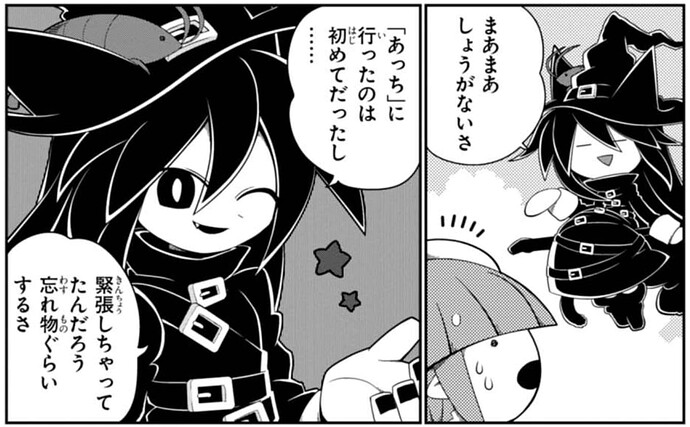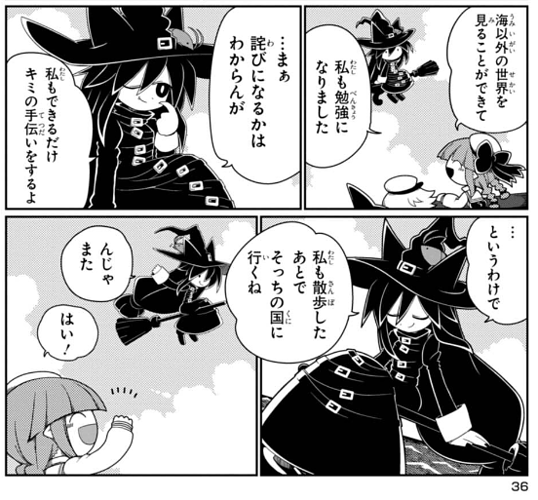I’m lost here:
Page 33
My understanding is that 黒巻 is wringing her lobster-familiar because it’s contradicting her.
In the left panel of your image, 黒巻 says: “It’s fine, it’s fine, it’s not bad to fly over the sea from time to time”
To which the Lobster replies “I was scared because it seemed that I’d fall off”
黒巻 “But it’s fine, isn’t it?” (or possibly, “but you are fine, aren’t you?”)
Lobster “It’s not fine.” (or possibly, “No, I’m not”)
黒巻 snaps, lobster wringing time
![]()
Ooookay! I thought that was all 黒巻 talking and I was so damn confused. Thank you ![]()
Another busy week for me. I’ll probably have to catch up on the weekend. I did manage to read a bit this morning though!
After typing my questions out, I think I mostly get page 34 but I’m not sure on all of it:
Page 34
だって いてるじゃん 鮫とイルカ
“After all, you are, aren’t you? A shark and a dolphin”
It felt pretty unclear who was saying this bubble. I assumed it was 黒巻 in the translation above.
In the left bubble, ドルピー says:
にて ないもん!!
“It doesn’t look like it!!”
Then in the bubble in the bottom right, メモカ says:
似て ねぇよ
That seems to mean “It looks like it”, but I would have expected the opposite based on the facial expressions. Am I missing something here? Oh… just realized she is probably saying “Looks like a dolphin” while ドルピー is saying “doesn’t look like a shark”.
You’ve misread the first sentence, which I think has cascaded to you misinterpreting the rest. It’s not いてる, it’s 似てる (to resemble). She’s saying “Come on, they look similar don’t they? Sharks and dolphins”.
Then the others are just saying “They do not!”
Oh, and 似てねぇ is 似てない, just pronounced in a rough (in this case due to irritation) way.
![]() Yup, I definitely didn’t
Yup, I definitely didn’t convert that to kanji when typing it out even type the right kana, then I translated the wrong thing. Thanks for the correction!
I have a question about page 33:
I think 黒牧さん is saying that she went in “that direction” for the first time? And that it was exhausting? But I am really not sure…
My translation so far:
あっちに行ったのは初めてだったし。。。
Since I went that direction for the first time
緊張しちゃってたんだろう忘れ物ぐらいするさ
it was mentally straining (?).
And then the last part I don’t get at all…
Does anyone maybe have a translation that makes more sense?
Page 33
I think rather than [Kuromaki] went there for the first time, it might be [Wadanohara] went there for the first time (as in the Witches’ Country). So Wadanohara was nervous and wound up forgetting something. Not sure how the grammar in 忘れ物ぐらいするさ works, though.
Since it’s in quotation marks, I’m inclined to think of it as “that place (you know, that one)”.
“(She) must have been nervous, I imagine.”
忘れ物をする would mean “to forget something” or “to leave something behind”. ぐらい here is definition #2 on jisho, meaning “at least” or something (it’s hard to come up with a generic word in English). The sentence means something like “It stands to reason she’d forget something” or “of course she’d forget something at the very least”.
Also, do people usually use spoilers when giving help, or just when asking questions? I’m not really sure what the protocol is.
Often I think it’s best to use the collapsible details thing in order to both not take up lots of space (especially with spoilered out stuff, and you also have a clear marking of which page you’re discussing spoilers for)
Often I think people tend to spoiler out any English at the least
If you want to know how the collapsible section will look:
[details=“Example”]
Secret spoilers, shh don’t tell anyone
[/details]
becomes:
Example
Secret spoilers, shh don’t tell anyone
Yeah I know how to use the collapsible and blur features, I just didn’t know if it was person-by-person or if there was some community convention. It makes sense to blur panels and stuff of course because sometimes people haven’t read that far.
It’d say there are some very basic community standards (avoid spoilers), and then each individual has a unique implementation of it (or based on what they see from others).
Typically I’ll spoiler-tag full English translations, but if I’m breaking down a sentence part by part, I won’t spoiler-tag the English translations of each part.
If it’s a long break-down, I’ll put it behind a details tag, in which case I’m less concerned about using spoiler tags. But sometimes I break things down in a way that the final English translation I’ll spoiler-tag so the person who read through the breakdown can try to put it together first before seeing my result.
Thanks! ![]() I never even considered 黒牧さん not talking about herself, but about Wadanohara… I does make more sense! That’s also why I was so puzzled about the last part of the sentence
I never even considered 黒牧さん not talking about herself, but about Wadanohara… I does make more sense! That’s also why I was so puzzled about the last part of the sentence ![]() It just didn’t make sense to me. So thanks again for clearing it up!
It just didn’t make sense to me. So thanks again for clearing it up! ![]()
So there are two things, where I am not too sure, if I translated them correctly:
Page 36
First, page 36:
As far as the dialogue goes something like this:
Wada: “I got to see the other ocean’s societies and I got to study them”.
Kuro: "maah… I don’t understand how it turned into an apolgy. I also only did it to give you a hand (to help you)
Kuro: “That settles it! I too will go to that to that country after I took a stroll”
I am unsure about my translation because Wadanohara apologizing to 黒牧さん seems kind of natural, considering the black witch came all the way to bring Wadanohara her forgotten item. Is Kuromaki-san just being polite? Or am I missing something in my translation?
Page 39
Second, page 39:

What is Wadanohara saying here?. I believe the meaning is “Let’s go” or probably “Should we go?”, but I don’t how grammar/vocabs work here…
I have two theories:
- Wadanohara is actually saying さあ行こう! But in a wierd way.
- さっ is an expression, probably translated to english as “so,…” and 行こっか consists of the question particle か and a short form of 行こう. Meaning the complete translation would be “So, should we go?”
A few quick fixes:
- 海以外 means “besides the ocean” or “other than (the ones in) the ocean”.
- 勉強になりました means “I was able to learn something” or very broadly “it was a worthwhile experience”
- The だけ here isn’t “only”, it’s “to the extent that…”. できるだけ is a pretty common pairing that basically means “whatever I’m able to do”. So “I’ll help you in any way I can”.
Yes, 行こうか
This sentence is tricky and I can see how it would be difficult to understand considering that 詫び is just given as “apology” on jisho.org. 詫び can mean something closer to “making up for it”, so 詫びになる means basically “to be sufficient as an apology” or “to sufficiently make up for it”. From the previous pages we know that she feels bad about Wadanohara having failed to get her memories back.
Then ~かわからないが is like “I don’t know whether…but…”. This is called an embedded question. So the complete sentence comes out to “I don’t know whether it’s enough to make up for (the fact that I couldn’t help you get your memories back), but… (I’ll help in any way I can)”
Chapter 3 thread is now up, link is in the schedule!
I have two questions. One for page 34 and the other on page 37.
page 34
My translations for the first two sentences:
やれやれやかましい使い魔だ。。。=> good grief, you (referring to the shrimp) are one noisy familiar
わだのはらの使い魔たちを見習ったらどうだ?=> why can’t you behave like wadanohara’s familiars?
I’m pretty certain this is what they are saying, but I’m confused on the ~らどうだ part. What does this mean?
page 37
それに。。。全ての鮫が「あんな奴」ってワケじゃない => besides, not all sharks are like that person (witch??)
This page where memoka is calming down dorubi, I think for this line memoka is trying to reassure her that not all sharks are horrible persons like that witch? However, I’m not sure what ワケ means. I couldn’t really find an answer on jisho or the web.
page 34
This was how I interpreted it:

I stole this off of Tae Kim’s Guide here: Desire and Suggestions – Learn Japanese if you want to have a look. Not sure if that really answer your question, but I hope it helps.
edit: page 37
this is the only this I could find for that: Jisho.org: Japanese Dictionary (where it’s just written in katakana instead for some reason), and that seems to be what’s listed in the vocab sheet as well. I think someone else posted about it at some point
Page 37
わけじゃない is a set phrase (JLPT Sensei). It means something anong the lines of “It’s not like” or “It’s not as though”. So in this case I think the full sentence might be “Besides, it’s not as though all sharks are like that guy”.
Thanks so much! Seems that I did misunderstand the dialouge quite a bit! ![]()


